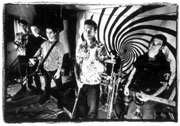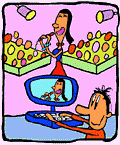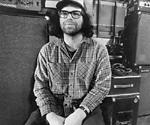THE WEEKEND ROAD TRIPS my friends and I used to take centered around this torture: Each passenger would bring one tape, which was played successively until someone broke down and jumped from the car. Such was my intro to Rocket from the Crypt’s second LP, Circa Now, which I’d grabbed randomly from the trash on my roommate’s floor just before one trip. There were groans when the Beatnuts came around for the sixth time, louder yet for Tsunami, but RFTC had us singing like drunks at a coal miner’s funeral, dirty feet out the window, passing the plastic whiskey bottle, and screaming “Sturdy Wrists” at the top of our teenage lungs while the cornfields of Indiana whizzed by.
Rocket From the Crypt
Crocodile Cafe, Wednesday, March 14
RFTC have left an impressive trail of equally screamable songs since those days, most recently a smart bunch called Group Sounds (Vagrant). Group Sounds is rock history fused with enough punk to keep it fun and enough dumb to keep it smart, simultaneously simple and over your head. And when RFTC come to town, it will be ass-kickings for everyone. Just ask their romantic lead, Speedo.
Seattle Weekly: I hope I didn’t get you up too early.
Speedo: Nope, I’m up at 6 every morning.
SW: Jesus. I didn’t see you at the Grammy Awards.
S: I guess my invitation got lost in the mail.
SW: What’s your take on popular music in the year 2001?
S: I wouldn’t really know—it’s not my world. I don’t listen to the radio much, and if I do, it’s oldies or talk. I assume pop music’s doing the same thing it’s been doing for the last 150 years, just cranking out miserable pap.
SW: Well, let’s talk about good music then. You guys trekked to record some tracks in Memphis. What did you get there that you couldn’t get in San Diego?
S: We’re obviously a band who respect the history of music, and that had something to do with our decision to go there. And there was a world-class studio that we wanted to check out, so it was partially to hit that studio and partially just to go and eat a lot of barbecue, let the moist Memphis air soak into our bones, and slow our pace down to a crawl. Everything just sort of halted and time stood still. Inspiration is a beautiful thing. If you sit around waiting for it to happen, you may end up waiting a long time, so we opted to go find it.
SW: So you were feeling it then?
S: Yeah, definitely. We walked the streets that so many of our heroes walked, through the neighborhoods, looking for traces of the golden era of rock and roll. We went to blues clubs and bars, local places where there’s a 60-year-old black dude sitting behind a couple of turntables with stacks of obscure soul and funk records and everyone is drinking Busch out of the bottle. It’s a completely different way of life from what we have here in Southern California; I can really appreciate its pace and its deliberateness. I got to record the vocals for “Ghost Shark” on Elvis’ grave. A friend of a guy who worked at the studio was one of the caretakers at Graceland, so we brought the mobile unit up to the side of the lawn and ran cables out. I sang it outside in the dead of night, with only a couple of people around, drinking wine. We did it at 3 in the morning, right by the eternal flame. It was cool.
SW: A lot of great live bands totally fail when they try to put their sound to tape. How do RFTC succeed?
S: It’s strange. Some of our cleanest recordings come from our band playing completely live in the studio. We try to go for this crazy, unhinged sound and we record it the way we play it live, and the end result is actually a slicker version than what we want. We have to take time to make things sound more raw so things don’t sound too perfect. On Group Sounds, one way we captured the live sound was by using a ghetto blaster to record the bass and the drums. It gave them a primal, more crazed interpretation of our sound, and by only doing the bass and the drums, it allowed us to use the vocals and the horns more clearly so you can hear more of what’s going on. We like really raw rock and roll records, but we don’t have a formula for capturing the sound. Every time we go to the studio, it’s like we’re starting all over again.
SW: When you play, you bring a whole show. Do you see yourselves as purveyors of the good old-fashioned ethics of showmanship?
S: Definitely. It’s those ethics that get you through the tough times, the times you don’t feel like playing—like when you’ve been screaming for three months straight and are spitting up blood because your throat is so raw. I hate hearing people complain about being in a band and being on tour. What we do for a living is not only one of the easiest things to do, it’s the most fun. Anyone can do it. You don’t have to be smart or special to do what we do. It just takes a good deal of resourcefulness.
SW: How does RFTC manage to stay so robust and youthful looking?
S: Jeez. Well, we don’t exercise; we don’t really eat well-balanced meals. We do practice six times a week, and generally the practices last between five and seven hours, and we sweat when we play—but that has more to do with the fact that we’re under those heat lamps.
SW: Have you ever considered—
S: No, wait! Tae-Bo! But we don’t consider Tae-Bo exercise—it’s a form of self-defense.
RFTC also play an in-store at Easy Street Records, 4559 California SW, Wednesday, March 14 at 4pm.








